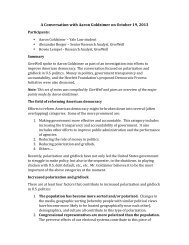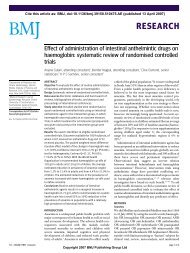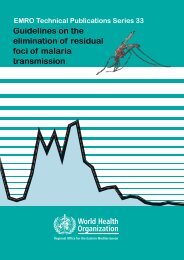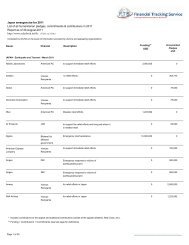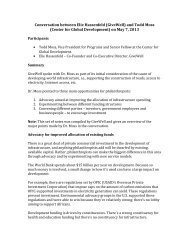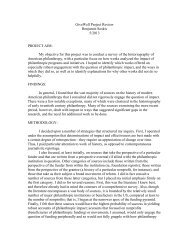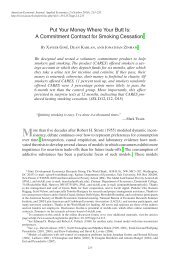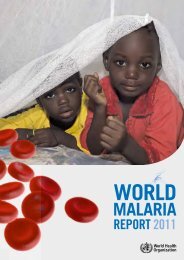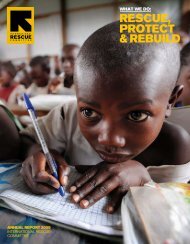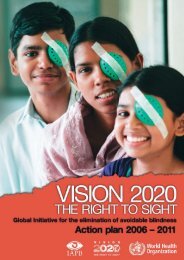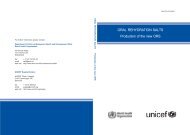Annual Report 2005 - Doctors Without Borders
Annual Report 2005 - Doctors Without Borders
Annual Report 2005 - Doctors Without Borders
Create successful ePaper yourself
Turn your PDF publications into a flip-book with our unique Google optimized e-Paper software.
© Harald HendenUgandaMany victims ofthe conflict in thenorth have beenmutilated.<strong>2005</strong>project supportOffice, which coordinates common projectson behalf of MSF’s 19 sections worldwide.It also supported MSF’s medical andhumanitarian advocacy efforts with the UnitedNations and other international bodies.23us annual report <strong>2005</strong>MSF’s International Campaign forAccess to Essential Medicines$275,000Confronting barriers to treatmentMSF-USA supported this advocacy campaign,which draws on MSF’s field experienceto promote greater access to affordableand effective medicines and diagnostics.fishing industries after the tsunami. In June<strong>2005</strong>, MSF was able to turn over to thenational AIDS program a project that, by theend of 2004, was providing antiretroviraltreatment to 965 people, of whom 10percent were children, in the provinces ofSurin and Mahasarakham. MSF continuedtreatment programs in the provinces ofKalasin, Nonthaburi, and Petchaburi.UGANDA $1,560,000International staff: 70 National staff: 857Caring for displaced peopleand treating HIV/AIDSMSF worked in northern Uganda to provideservices for those displaced by the longcivil war. Through hospitals and mobileclinics, MSF provided health care, rannutritional programs, and offered psychosocialcounseling to people living intowns and displaced-persons camps inGulu, Kitgum, Lira, Soroti, and Paderprovinces. MSF also ran night sheltersfor children who sought safe places tosleep each night to avoid being abductedby rebels and forced into combat orsexual slavery. In Arua, MSF providedmedical care for nearly 3,000 people livingAdapting AIDS Treatmentwith HIV/AIDS, including more than 2,050who received antiretroviral treatment.ZIMBABWE $641,050International staff: 31 National staff: 119Helping thousands evictedfrom their homesMSF provided basic health care reliefitems in response to the Zimbabweangovernment’s campaign Operation RestoreOrder, which demolished illegal settlementsin urban areas, leaving approximately700,000 homeless. Additionally, MSF caredfor HIV/AIDS patients in eastern Manicalandprovince, donating medicines and incorporatingdisplaced people into supportgroups. In Matabeleland North province,MSF had treated 1,000 adults and 250children with antiretroviral medicines byAugust <strong>2005</strong>.Advocacy, Coordination,and ResearchMSF International Office $490,801Supporting advocacy andnetwork coordinationAs part of the MSF network, MSF-USAhelped to support the MSF InternationalDrugs for Neglected DiseasesInitiative (DNDi) $1,076,614Developing medicines forforgotten diseasesThis partnership involving MSF, the WorldHealth Organization, and key public researchinstitutes was launched in 2003 toresearch and develop new medicines totreat diseases such as sleeping sickness,kala azar, and Chagas disease. DNDi isalso working to register existing medicineswith various nations’ drug regulators sothat they can be used against theseneglected diseases.Epicentre $413,000Carrying out operational researchEpicentre is a nonprofit research centerfounded by MSF in 1987. MSF has continuedto support this center, which conductsepidemiological assessments and studiesto assist MSF in understanding medical andnutritional needs, improving treatments,and developing high-quality health careinitiatives in its field projects.Other funding distributions $28,500Bangladesh, Cambodia, India,Nicaragua, The Philippines, SomaliaTotal Project Supportthrough US PrivateFunding in <strong>2005</strong>:$72,681,515By decentralizing care to rural areas, treating patients based mainly on clinical indications, and training nonmedicalpersonnel to dispense and to monitor adherence to free, fixed-dose combinations of ARV treatment,MSF has been able to put more than 57,000 people on ARVs and achieve clinical results comparable to thoseInnovationfound in wealthy countries.



